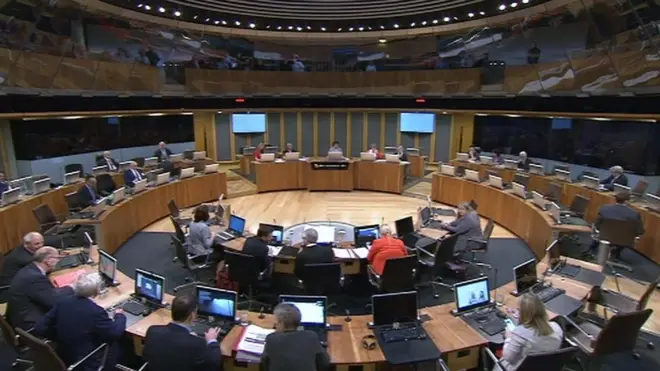The protest against the controversial finance bill in Kenya took a new turn on Tuesday when parliament building is set ablaze, mace taken and police fired live bullets at demonstrators in Nairobi

Despite protests from hundreds of Kenyans, the Kenya Parliament has finally passed the 2024 finance bill. A total of 195 MPs on Tuesday, June 25, 2024 voted in favour of the bill while 104 voted against, and 3 void votes. The finance bill will now be sent to the Kenyan President, William Ruto for assent. The new taxes are claimed to be aimed at debt repayment and economic stability by Ruto’s administration.
Following the passage of the bill, protesters took a drastic turn and forcibly entered the parliament building by breaking the fence. Once inside, they tore up flags, upturned chairs and tables, and reportedly took the ceremonial mace, which is the symbol of authority of the parliament. Gunshots were also heard as Kenyan police reportedly opened fire on the protesters.
There were several footages from multiple Kenyan media outlets showing how part of the parliament building was set ablaze. Lawmakers at the parliament building managed to escape through an underground tunnel, according to NTV Kenya. However, the fire was later put out.
A Reuters journalist outside the parliament counted the bodies of at least five protestors, while a paramedic reported that at least ten people had died.
Also, Auma Obama, the half-sister of former US President Barack Obama, who joined the protests, was tear-gassed by police during a live interview with CNN.“I can’t even see anymore, we’re being teargassed,” she cried out.
READ ALSO: Protest in Kenya over proposed tax hikes in finance bill
OrderPaper recalls that the bill has sparked widespread protests in Kenya since last week. The lawmakers faced criticism for introducing a series of new tax proposals, marking the second time in two years, despite the rising cost of living in the country. Protesters from OccupyParliament took to the streets of Nairobi to urge lawmakers to reject the proposals. Additionally, there was a surge in opposition to the bill on social media platforms such as X and TikTok. Security forces have now been accused of abducting prominent Kenyans, particularly those with large social media followings.
Opposition parties and civil society groups called on the government to cut non-essential spending to alleviate the tax burden, but the lawmakers instead introduced amendments to compensate for the scrapped taxes. The fuel levy was raised by 39% to KES25, and taxes now make up 40% of the cost of a litre of petrol.
Protesters, opposition parties, and civil society groups have also urged the government to reduce the tax burden by cutting the budget in non-key areas.
However, instead of reducing expenditures, lawmakers have introduced amendments to compensate for the scrapped taxes. The fuel levy has been increased by 39% to KES25, and currently, taxes account for 40% of a litre of petrol.
Some other aspects of the bill that was later amended were an increase in the import declaration levy from 1.5% to 2.5% of all imports, as well as an increase in the railway development levy from 1.5% to 2.5% of import value. Following the protests, certain parts of the bill were expunged, such as a proposed 16% value-added tax (VAT) on bread, taxes on foreign exchange transactions and financial services, and a 2.5% car tax.
According to a former lawmaker, Billow Kerrow, “All the three amendments have a significant impact on the cost of living and the competitiveness of our products (goods manufactured in Kenya.”



